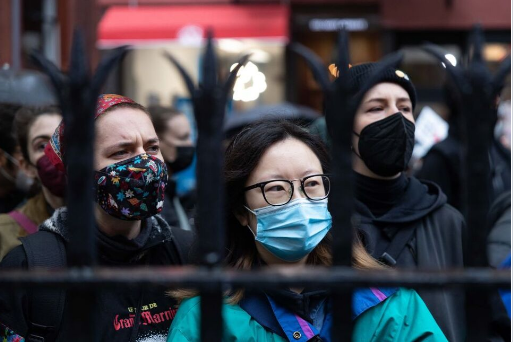For some Roe v. Wade critics, it's not about abortion itself but the way abortion freed women from being tied to family and work roles that kept them down.
Another tweeter offered up an opinion in cartoon form – actually, a doctored version of a cartoon that originally showed a married woman with a child, side by side with a single woman with a glass of champagne and a slice of pizza, describing both as “an established and complete woman.” The post-leak, manipulated cartoon put a pained scowl on the single woman's face and added a cat, a sex toy, and a scrawled wall tally of “men I've whored myself out to.” Her new title? “Victim of feminism.”
The apparent demise of guaranteed abortion rights cheered anti-abortion activists, who have long worked to achieve what they see as a single issue of the right to life, starting with conception. The groups' absolutist opposition to abortion in all cases, including rape and incest, alarms some people but is intellectually consistent, the anti-abortion activists say: They are, after all, judging abortion itself instead of singling out women who voluntarily had sex.
But the draft opinion, occurring after decades of slow but steady progress for women in educational, professional, and social arenas, has also unearthed a deep resentment of the successes and choices women now have, women's advocates and scholars say. For those Roe v. Wade critics, it's not about abortion itself, but the way abortion freed women from being tied to family and work roles that kept them down.
“What we face as a nation if Roe v. Wade is overturned goes beyond contempt for those not having children,” says Noreen Farrell, executive director of the women's rights group Equal Rights Advocates.
“The decades-long fight against the constitutional right to abortion has never been just about abortion. It is about keeping women in restricted gender roles, raising children instead of working, dependent on male breadwinners, and isolated from the political process affecting their lives,” Farrell adds.
The single-issue groups fighting abortion don't engage in the rhetoric of Gaetz or of his GOP Georgia colleague, Rep. Marjorie Taylor-Greene, who said Satan whispers in women's ears, telling them their boyfriends will marry them if they have abortions. Instead, they speak about the morality of abortion, which the groups view as the murder of a child.
“This is specifically about abortion” and not broader social issues, says Mallory Carroll, a spokeswoman for the anti-abortion group Susan B. Anthony List. “It's about the unborn life in the womb, half of which are women. This is a woman-led movement to protect unborn children and their mothers.”
But for political and religious conservatives, the ultimate embrace of anti-abortion views has been more complicated, more intertwined with other social changes that started in the 1960s, social scientists and historians say.
